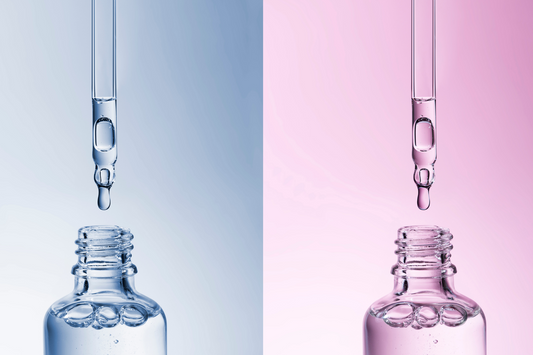If you’ve been searching for ways to increase hair growth on your scalp, you might have come across MSM for hair growth - but does it actually work? MSM, whose longer name is methylsulfonylmethane, has numerous, documented health benefits. This article will go into detail on the health benefits of MSM, the scientific evidence for how MSM impacts your body, and discusses whether MSM for hair growth really works. Read on to learn more!
What is MSM?
MSM, or methylsulfonylmethane, is a sulfur-based chemical compound often produced naturally in some primitive plants and animals, but as a drug, it is usually made in a scientific labratory. It is also often called methyl sulfone or dimethyl sulfone, and it can often be found in the air above marine water, where it’s often used as fuel by the airborne bacteria species Afipia.
What is MSM used for?
Currently, no medical uses of MSM have been approved by the FDA. MSM has been reported to have anti-inflammatory properties and is sometimes used as a dietary supplement or as a topical treatment. As a dietary supplement taken by mouth, it is sometimes used to relieve joint pain from conditions like osteoarthritis, rheumatoid arthritis, bursitis, tendinitis, and tenosynovitis. IWhen applied to the skin, it’s intended to be used to treat wrinkles, sunburn, or scars. However, these applications historically lack extensive clinical evidence, so how good MSM really is for these applications remains up in the air.
MSM for hair growth
But what about MSM for hair growth? The short answer to this question is that there is still not enough scientific or clinical research to support evidence of MSM improving hair growth.
There have been small-scale studies in the past. One study from 2009 tested the efficacy of MSM and another compound, magnesium ascorbyl phosphate (MAP), and the ability of these compounds to impact hair growth in mice with alopecia, a medical condition that causes hair loss. While the study did not yield results indicating that MSM is particularly effective, it did indicate that MSM and MAP have positive outcomes depending on how much MSM is applied versus MAP.
Additionally, a 2019 study on 63 participants indicated that MSM, when consumed at 3 grams per day, can improve the appearance of hair and nails. However, this was also a small sample size, and the study did report conflicts of interest. It’s important to always double check the sample size and potential conflicts, when judging clinical studies and their conclusions. Overall, MSM for hair growth is backed by largely inconclusive evidence.
Other ways to encourage hair growth
Although MSM for hair growth seems to not have enough verified scientific evidence backing it - fear not, here are some other ways to encourage hair growth and stop hair loss!
Diet
Here are some nutrients that have been proven to be effective in triggering hair growth and may be more effective than MSM for hair growth:
- Biotin: Biotin is a B-vitamin that has been proven to be beneficial for hair growth; one study showed that women with low biotin levels were significantly more likely to experience hair loss than women with normal biotin levels.
- Essential oils: Oils from plants like coconut, lavender, almonds, and rosemary can help soothe, moisturize, strengthen, and volumize your hair.
- Saw palmetto: This fruit from a palm tree native to the Southeast United States region has been proven to be effective towards helping hair growth by reducing DHT, a bodily compound that has been widely known to cause hair loss.
Lifestyle changes
- Reducing alcohol consumption: It’s important for your body to absorb sufficient nutrients (such as the ones mentioned in the previous section) that can allow your hair to thrive. Excessive drinking can completely undo this, so consider reducing your alcohol consumption if you’d like to curb hair loss.
- Reducing sun exposure: The sun’s harmful ultraviolet rays can easily break and damage your hair. If you are trying to prevent hair loss, consider wearing a hat or carrying a parasol on especially sunny days to protect your hair.
- Exercising regularly: Hair loss has also been linked to stress, and regular exercise has been proven to reduce hair loss. The National Health Service recommends at least 150 minutes of moderate exercise a week, or 75 minutes of vigorous exercise a week.
Conclusion
So it turns out that there is largely inconclusive evidence supporting MSM for hair growth. However, there are so many other more effective (and research-backed) ways, other than MSM for hair growth, that can help prevent hair loss! And one of these methods, though not mentioned previously, is Revela’s Hair Revival Serum, the world’s first clinically tested hair treatment for hair loss and the first solution using ProCelinyl, our proprietary ingredient, to greatly improve hair follicle health. Find out more about ProCelinyl here!
Sources
- https://www.webmd.com/vitamins-and-supplements/msm-methylsulfonylmethane-uses-and-risks
- https://medlineplus.gov/druginfo/natural/522.html
- https://en.wikipedia.org/wiki/Methylsulfonylmethane
- https://my.clevelandclinic.org/health/body/23204-keratin
- https://pubmed.ncbi.nlm.nih.gov/33313047/
- https://www.nih.gov/news-events/nih-research-matters/how-stress-causes-hair-loss
- https://www.ncbi.nlm.nih.gov/pmc/articles/PMC4989391/
- https://www.express.co.uk/life-style/health/1394629/how-to-reduce-hair-loss-lifestyle-changes-evg





